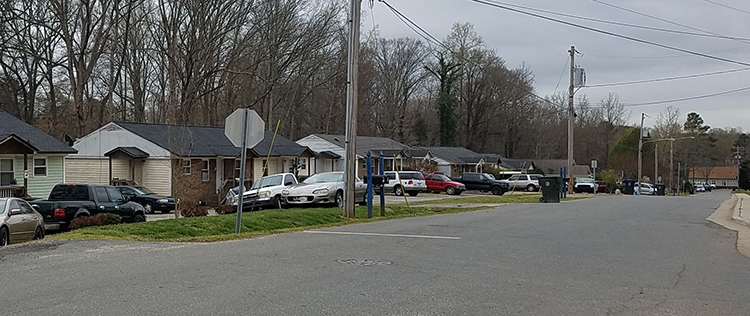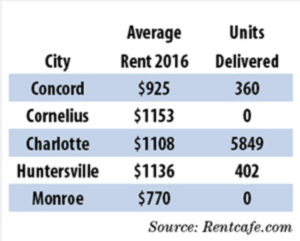
[This story originally ran in print and online in March 2018] By Dave Yochum. When you look on an aerial map of Cornelius you can see it pretty quickly. Some of the most run-down, substandard housing in Cornelius is only a mile away from well-tailored million-dollar homes.
There are dwellings within an easy walk of those million-dollar homes where adults and children are literally falling through the cracks. There is a growing shortage of affordable housing in Cornelius, as well as an abundance of substandard homes on one end of the scale and luxury homes on the other end.
“Affordable housing doesn’t mean ‘poor,’ it means affordable,” says Jim Duke, a former Cornelius Town Commissioner and community leader who lives in one of those large homes in The Peninsula. But his grand-daughter doesn’t. She teaches seventh grade math in Charlotte and, for her, affordable housing is sharing a three-bedroom apartment with two other teachers.
A Newsmakers Breakfast on Affordable Housing will be held March 21 at The Peninsula Club. There will be an open-forum Q&A with four leaders in the field of affordable or workforce housing.
 Cornelius rents are soaring. Average rents here, according to RentCafe.com, are the highest in the Charlotte region, at $1,153 a month. From January of 2014 to December of 2016, average rents in Cornelius rose 15 percent. Cornelius’ average rents are higher than Charlotte.
Cornelius rents are soaring. Average rents here, according to RentCafe.com, are the highest in the Charlotte region, at $1,153 a month. From January of 2014 to December of 2016, average rents in Cornelius rose 15 percent. Cornelius’ average rents are higher than Charlotte.
Driving the increase: No new apartment buildings were completed in 28031 during 2016. Gentrification is also a factor. With property values soaring, mutli-generational neighborhoods are under pressure as well. The next generation may not afford to stay close by, something that adds a richness and depth to neighborhoods.
“Families with incomes significantly lower than a median often struggle to find affordable, safe neighborhoods to raise their children,” Duke says. “It is our responsibility as a Town to ensure that all citizens have access to residences they can afford.”
There are lots of drivers around being unable to afford decent housing, not just income.
Domestic violence is one. And children, of course, have no control over where they live, perpetuating generations of struggling families, often led by single women. Evictions by slumlords can happen at the drop of a hat. Then, too, many people in undesirable housing situations remain there out of fear: Some may be illegal immigrants, or have members of the family who are.
And they’ll never complain or speak up, says Jeff Porter, who led Habitat for Humanity in Cornelius for several years.
He says one in five people here lives in substandard housing, “anything from failing plumbing and heating and air conditioning systems to mold.” Follow the money: New housing is built along class lines.
A back porch: $900 a month
Porter says there is a family living here on a back porch—a porch—for $900 a month.
“A lot of people are afraid to ask for assistance because they are afraid the house will be condemned,” he says.
“People are secretly living in poverty,” Porter says. One elderly couple lived for five years without plumbing before they asked Habitat for help. Another family is living in Cornelius on a back porch. Their rent is $900 a month, Porter said.
The protests and riots that rocked Charlotte last September really weren’t about a police shooting. They were more about economic disparity: Charlotte ranks dead last on a list of 50 US cities in terms of upward mobility.
At a community meeting shortly after the Charlotte riots, former Cornelius Mayor Chuck Travis asked, “are we prepared for what might happen in our community?” Apologizing to the audience for not having a conversation sooner about race relations, he also called for more affordable housing in Cornelius.
“There must always be a place for all in any healthy and diverse community,” Duke says.
Teachers, firefighters, police don’t necessarily pull in the bucks needed to raise a family in Cornelius, but they don’t qualify for government assistance either, Porter says.
“If they live here, the people who police our neighborhoods, teach our kids and fight our fires are much more engaged than those who drive in,” Porter says.
Cul de sac communities isolate people. “We’ve done a really bad job with planning,” Travis said at that meeting in September.
“There was a time in our community when we did live closer together and there was that sense of community. You knew all the social standings, you had the rich, the blue collar community, we knew each other, but as we became more and more suburbanized, now you see the increase in violence, you segregate poverty and push it to the outskirts,” says Porter.
There’s a small business impact as well. “Some employers are already having trouble hiring people from out of town due to the traffic and this will only get worse. In turn, critical services and businesses, such as police and fire, teachers, skilled workers, along with wait staff and sales people, will suffer. This will result in a decline in our quality of life,” says Town Commissioner Mike Miltich.
Fixing the problem
The problem can be fixed, Porter says.
Habitat builds about 15 affordable houses a year for working people who put sweat equity into their new homes as well. Twenty families in Cornelius are on the Habitat waiting list.
Affordable housing changes the dynamics in any given household. “It enables people to afford the medicine, the food, the clothing they need to live a stable life,” Porter says.
The old approach to affordable or subsidized housing was to segregate everyone into towers or specialized areas, creating “all sorts of problems we know don’t work,” he says.
“What we know is affordable housing when it is integrated into market-rate housing, there will be a much more healthy and stable effect that occurs,” Porter says. “We are at the threshold of a much healthier proven way of integrating affordable housing into neighborhoods.”
Travis says there is a shortage of affordable housing on the west side of Cornelius. Habitat hopes to scatter affordable housing, instead of concentrating it in a single area, like Poole Place on the sharp turn in Bailey Road.
Porter says Davidson has “given us a good example of how to” incorporate higher density housing in large projects so that for-profit builders can include affordable housing at the start of planning.
“It’s with the for-profit homes…where you get that mixed-income, not a lot of affordable housing altogether. That’s so important. Affordable housing is like a relief valve. If you give people hope, it is the perfect antidote to violence,” Porter says.
It’s actually hard to picture violence in Cornelius, but it happened in Charlotte where the privileged and upwardly mobile were convinced it couldn’t happen. “We have started the conversation, but we’re not really ready for the conversation. … how do we actually improve affordable housing? We are not unique…[countless] towns are dealing with the same issues,” Police Chief Bence Hoyle said.
There’s a practical side, in addition to a ready supply of workers for employers: The owners of affordable houses pay real estate taxes too. Habitat homes alone paid $124,540 in taxes last year.
The town has a number of lots and even houses on the books that could be sold to Habitat, and then re-sold. “We envision affordable housing being integrated with market-rate housing in such a way that the two are imperceptible from the outside as people drive by,” Porter says.
For the first time, Miltich said, Cornelius is discussing affordable housing in earnest within Town Hall.
We are at an important crossroads in our town, said Mayor Pro Tem Woody Washam. He plans to create a “human relations advisory board” which will have affordable housing research, study and recommendations as part of the mission.
“With land being developed and bought up for development, it is past time for an action plan. We’ve talked about this matter long enough and the time of action is upon us,” Washam said.



